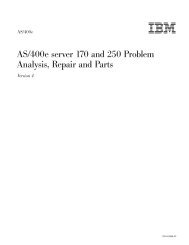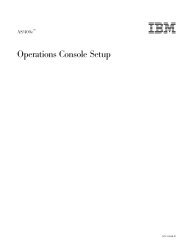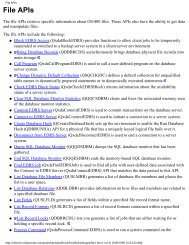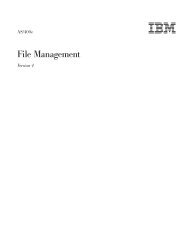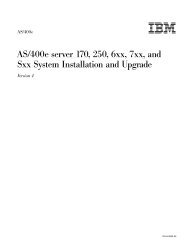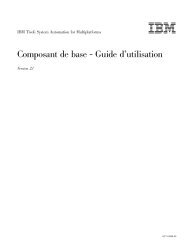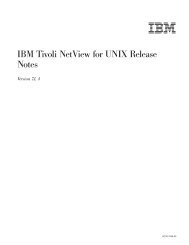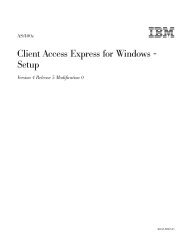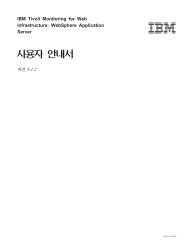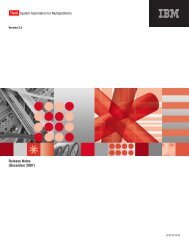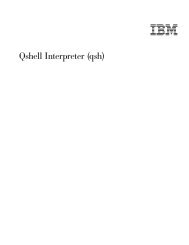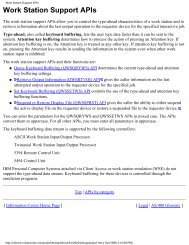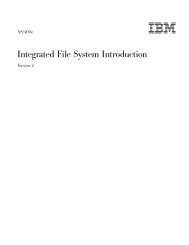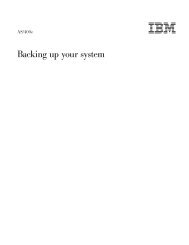Data Queue APIs--Categories - FTP Directory Listing - IBM
Data Queue APIs--Categories - FTP Directory Listing - IBM
Data Queue APIs--Categories - FTP Directory Listing - IBM
Create successful ePaper yourself
Turn your PDF publications into a flip-book with our unique Google optimized e-Paper software.
List Objects (QUSLOBJ) API<br />
For details about the formats, see Format of the Generated Lists. For performance reasons, you<br />
should choose the format that returns only as much information as you need. The higher the number<br />
of the format name, the more information is returned and the more time it takes to process.<br />
Object and library name<br />
INPUT; CHAR(20)<br />
The object and library names to place in the *USRSPC object. The first 10 characters contain the<br />
object name, which may be a simple name, a generic name, or the special values of *ALL,<br />
*ALLUSR, or *<strong>IBM</strong>. When *ALLUSR is specified with a library name of *LIBL or QSYS and an<br />
object type of *LIB, a list of all user-defined libraries is returned. When *<strong>IBM</strong> is specified with a<br />
library name of *LIBL or QSYS and an object type of *LIB, a list of all system (<strong>IBM</strong>) libraries is<br />
returned. This is the list of libraries that were saved or restored on the Save Library (SAVLIB) or<br />
Restore Library (RSTLIB) CL command with LIB(*<strong>IBM</strong>).<br />
Library name errors are reported with escape messages when a single library is specified. When<br />
searching a set of libraries (*ALL, *ALLUSR, *LIBL, or *USRLIBL), library errors are reported<br />
with diagnostic messages and processing continues. Library authority error messages are not sent<br />
when searching a set of libraries. Escape messages are not sent for object name errors. To determine<br />
if errors occurred on the object, use the number of list entries field returned in the generic header<br />
and the information status field in format OBJL0200.<br />
The second 10 characters identify the name of the library or libraries to search for the specified<br />
objects. The following special values are allowed:<br />
*ALL<br />
All libraries<br />
*ALLUSR<br />
All user-defined libraries, plus libraries containing user data and having names starting with<br />
Q. All libraries with names that do not begin with the letter Q are searched except for the<br />
following:<br />
#CGULIB #RPGLIB<br />
#COBLIB #SDALIB<br />
#DFULIB #SEULIB<br />
#DSULIB<br />
Although the following Qxxx libraries are provided by <strong>IBM</strong>, they typically contain user data<br />
that changes frequently. Therefore, these libraries are considered user libraries and are also<br />
searched:<br />
QDSNX QUSRADSM QUSRPYMSVR<br />
QGPL QUSRBRM QUSRRDARS<br />
QGPL38 QUSRDIRCL QUSRSYS<br />
QMQMDATA QUSRDIRDB QUSRVxRxMx<br />
QMQMPROC QUSRIJS<br />
QPFRDATA QUSRINFSKR<br />
http://infocntr.rchland.ibm.com/pubs/html/as400/v4r5/ic2924/info/apis/quslobj.htm (3 of 25) [10/4/1999 2:35:53 PM]



